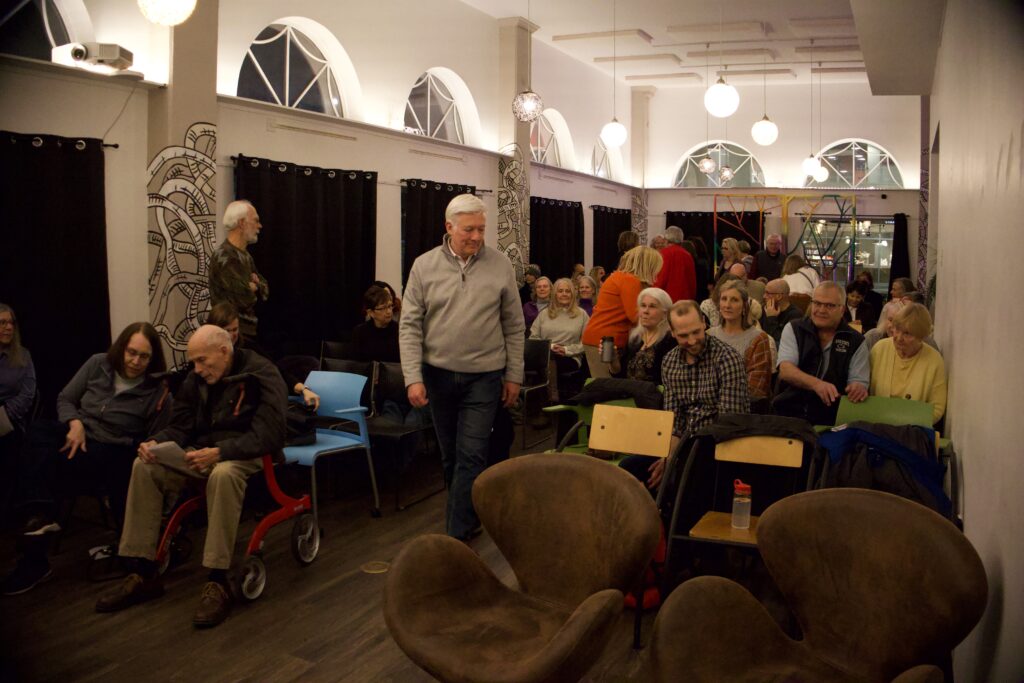Once upon a February evening, seven storytellers took the stage in front of an audience of about 70 people and shared heartfelt stories about how they learned “Love Lives On” after loss.
These were not professional public speakers. They were simply community members with a story to tell, and for most of them, this was a new experience they came to through State of the Story, a State College-based storytelling group.
SOTS began 13 years ago in The Attic at The State Theatre, moved to Webster’s Café, and now holds six shows each year at 3 Dots. The February show is always a collaboration with Learning to Live: What’s Your Story?, a local grief group.
SOTS refers to its approach as a “Moth-like” style of storytelling, because it follows the basic tenets originated by The Moth, a New York City-based organization founded in 1997 that puts out the weekly Moth Radio Hour podcast and sponsors personal narrative storytelling events across the country.
The SOTS format generally involves seven-minute stories, presented in a conversational style with no notes or props, about a true event or experience from the storyteller’s life.
The stories are based on a theme that serves as sort of a writing prompt—themes like “Lost and Found,” “Grief Surprises,” “Wrong Turns,” and “Isn’t it Ironic?”
“I call it ‘verbal memoir,’” says Beth McLaughlin, who is one of the group’s coordinators, along with Anne Hoag, Vicka Kharitonova and Helen Dempsey. “It’s your own story to tell, and it’s really about a moment or moments in time when something happened that affected your life.”
While SOTS welcomes and encourages new community members who would like to try their hand at sharing a story, this is not some kind of “open mic” event. Participants are well-prepared, having worked diligently on crafting their stories for several weeks with a coach and with each other.

“What makes SOTS unique is we do what I call ‘collective creative process,’ which means everyone in the group is part of listening to everyone’s story, saying what’s working, asking questions, making suggestions and then, at each successive practice, the storytellers come back with a refined version of their story,” McLaughlin explains.
Jody Whipple was a storyteller at the February show, in which she shared a story—at turns funny, sad, touching and sweet—about the loss of her father and her beloved golden retriever, and how she ultimately honored her father by bestowing his name (and the name of her best friend’s father) on a new puppy.
Whipple says of the group story crafting process: “That was as meaningful, or more meaningful, as the actual night. You walk into a room with a group of people—I didn’t know most of them—and just kind of lay out a pretty vulnerable experience, and when you do that, you connect with people really quickly. It was a very welcoming, nonjudgmental group. Amazing listeners. I felt incredibly heard while I was there talking about my experience, and I really wanted to listen very closely to other people and give feedback and suggestions and encouragement.”
McLaughlin frequently serves as a coach or a “ringleader” for the group practices, which she says happen twice a week during the two weeks leading up to the event. Story crafting can involve working on transitions and pacing and making sure the story is all told from a very personal perspective, as opposed to a speech-like presentation that tries to persuade, or teach a lesson.
Practice also involves getting to know the story so well that it can be told without rote memorization. That can be tricky, but Whipple says, “I think if you can trust yourself to tell the story that’s true for you, versus making it a performance, then it comes much more naturally. … If you think about it as if you’re talking to a friend that you’re out to dinner with, or sitting beside on a car ride—if you can get in that mindset, it’s easier.”
“The practices aren’t just to make the stories better. It’s self-reflection. It’s therapeutic,” McLaughlin says. “I don’t think there is anything more important than understanding your own experience. SOTS is one way to do that. It is my absolute favorite thing.”
While the storytellers find the preparation and participation rewarding, the shows are also meaningful to audience members, McLaughlin says.
“As an audience member, the thing I love about it is, I can connect with a lot of the stories. I learn something about the storyteller or about something I didn’t know about. I am inspired by people’s stories. And I’m always grateful, because I know it takes a certain level of bravery to get up there on the stage and tell your story and be vulnerable about it and to try it.”
Shows take place one evening each month in September, October, November, February, March and April. Most shows feature a musical guest.
Upcoming State of the Story
WHEN: Monday, April 15, at 7 p.m.
WHERE: 3 Dots, 137 E. Beaver Ave.
TICKETS: $7; $5 for students
Visit 3dotsdowntown.com for more information or to purchase tickets.
To learn about participating as a storyteller in a future event, join the State of the Story group on Facebook.
T&G
Karen Walker is a freelance writer in State College.



